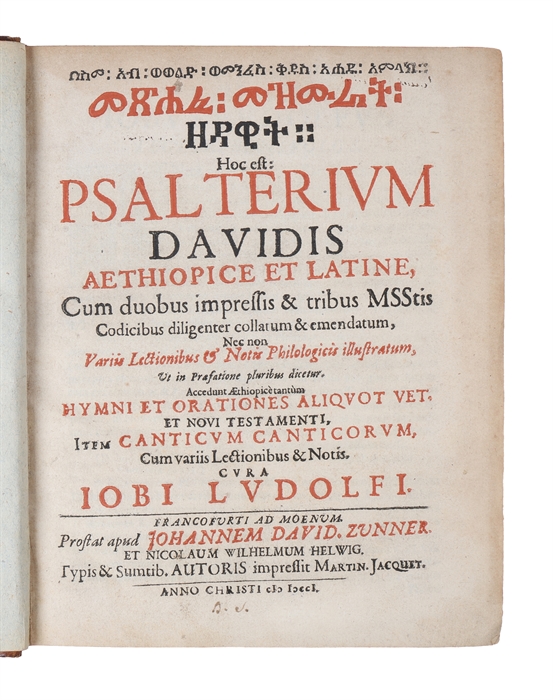FIRST COMPLETE EDITION OF THE ETHIOPIC PSALTER
LUDOLF, HIOB.
Masehafa mazemurate zaDawite [In Geez], hoc est psalterium Davidis Aethiopice et Latine...
Frankfurt am Main, Zunner, 1701.
4to. In contemporary full mottled calf with five raised bands and richly gilt spine. A few scratches to boards and spine-ends slightly chipped. Leather on spine cracked.
“ex dono Prof. B. Thorlacii” in contemporary hand to front free end-paper - likely referring to the Danish classical scholar and theologian Børge Thorlacius (1775–1829), professor at the University of Copenhagen and Secretary of the Royal Danish Academy of Sciences.
Title page in red and black with the first three lines in Ethiopic. Last 10 ff. with hole in outer margin, not touching text, otherwise internally a nice and clean copy. (8), 427, (1) pp.
First complete edition of the much celebrated Ethiopic Psalter edited by the great orientalist Hiob Ludolf, the founder of European Ethiopic (Geez) studies. This is the first complete edition of the Book of Psalms printed in Ethiopic characters, accompanied by a Latin translation and extensive philological notes – it is widely regarded as being a high point in Ethiopian studies. “The first printed Ethiopic text (not by accident the psalter, the most commonly read Christian Ethiopic book) dates from 1513, with a second four-language edition in 1518, both edited by Potken in Rome (1513) and Cologne (1518). A few Ethiopic texts were also printed in the seventeenth century, but it was only with Hiob Ludolf (1624–1704) that text editing was carried out in such a way that it can be methodologically evaluated. Ludolf’s edition of the psalter [The present] still stands out as an advanced example of method in some respects: Ludolf based his edition on three manuscripts and the two available prints, and was well aware of questions of normalisation and standardisation. He did not hesitate to reintegrate ex nihilo missing verses or hemistichs when they were attested by the Greek and Hebrew text and missing in the Ethiopic version, where he explained their absence as due to the inaccuracy of the copyist, so that, ultimately, he fundamentally based his edition on his own iudicium (Ludolf 1701, 2v–3v). Hiob Ludolf Hiob Ludolf (1624–1704), also known as Job Leutholf, was a German orientalist, born at Erfurt often referred to as "the most illustrious name in Ethiopic scholarship". While searching in Rome for some documents at the request of the Swedish Court, he became friends with Abba Gorgoryos, a monk from the Ethiopian province of Amhara and acquired from him an intimate knowledge of the Ethiopian language of Amhara. In 1690 he was appointed president of the Collegium Imperiale Historicum. Darlow & Moule 3571.
The work is one of the earliest examples of a critical edition of a Biblical text in Ethiopic and remains a cornerstone in the history of Ethiopic printing and European biblical philology.
Nonetheless, this edition of the psalter, also furnished with a commentary, is still of great importance because of the critical comparison with the Greek and Hebrew texts on which it is based. Ludolf’s works represent the high point in Ethiopian studies within the context of oriental studies in the modern age”. (Roelli, Handbook of Stemmatology)
Brunet IV 921.
Order-nr.: 62765


![Masehafa mazemurate zaDawite [In Geez], hoc est psalterium Davidis Aethiopice et Latine...](/images/product/62765c.jpg)
![Masehafa mazemurate zaDawite [In Geez], hoc est psalterium Davidis Aethiopice et Latine...](/images/product/62765a.jpg)